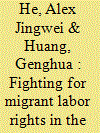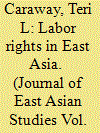|
|
|
Sort Order |
|
|
|
Items / Page
|
|
|
|
|
|
|
| Srl | Item |
| 1 |
ID:
175475


|
|
|
|
|
| Summary/Abstract |
Although much has been written about China’s Belt and Road Initiative (BRI), so far little attention has been paid to how Chinese investment is affecting workers in BRI-targeted countries. To explore this dimension of global China, this paper examines the labor rights situation at Chinese-owned construction sites in Sihanoukville, a city on the Cambodian coast that in recent years has been described as embodying the worst excesses of Chinese foreign investment. Based on extensive interviews with Chinese and Cambodian workers, this paper argues that while Chinese-owned construction sites in Cambodia are grounded in a labor regime as exploitative as those in mainland China, workers’ agency in the former case is further undermined by their employers’ adoption of a policy of labor force dualism that draws boundaries between Chinese and Cambodian workers.
|
|
|
|
|
|
|
|
|
|
|
|
|
|
|
|
| 2 |
ID:
178727


|
|
|
|
|
| Summary/Abstract |
While a dominant position in research on compliance holds that enforcement is necessary for states to abide by their international commitments, many international organizations (IOs) do not have recourse to such coercive means. This article offers the first systematic analysis of one prominent alternative to material coercion: compliance reporting by IOs. It develops an argument for why reporting by IOs should lead states to correct non-compliant behavior, and when those effects should be particularly strong. It tests this argument in the context of the International Labour Organization (ILO), which offers a unique setting for evaluating the impact of reporting in the absence of coercion. The principal findings are threefold. First, reporting has significant and durable effects on state respect for labor rights. Second, reporting affects compliance both immediately and when repeated over longer periods of time. Third, reporting has stronger effects on improvements in labor rights when target states are democratic and resourceful, and have a stronger presence of labor NGOs. By contrast, it does not matter to reporting’s effect whether states are highly economically dependent on the outside world or whether reporting is coupled with active shaming of non-compliant states. Taken together, our results suggest that existing research has not fully appreciated the potential of monitoring systems based on reporting to generate compliance with international rules. While hard enforcement may still be important, especially in areas where incentives to renege are strong, the findings of this article suggest that it is not the exclusive path to compliance.
|
|
|
|
|
|
|
|
|
|
|
|
|
|
|
|
| 3 |
ID:
137500


|
|
|
|
|
| Summary/Abstract |
China's dizzying economic achievement is not mirrored in its labor rights protection record. Migrant workers in particular do not enjoy rights commensurate with their contribution to the economy. The pervasive infringement of labor rights and the failure of the official protective system have jointly created a niche for nongovernmental organizations (NGOs). This article investigates the grassroots migrant labor NGOs in the Pearl River Delta region, an area which has seen unprecedented increases in labor disputes both in terms of quantity and intensity. Making extensive use of in-depth interviews and participatory observations, it examines the strategies and tactics NGOs use for survival and growth in a hostile external environment. This article reveals that administrative illegitimacy and resource shortage have been the two key challenges for grassroots NGOs; in order to survive, they have developed a series of strategies to enhance legitimacy and explore resources. In the meantime, however, antagonistic thinking still drives the government's response to grassroots organizations unless the latter can skillfully balance political ideology and actual operation. Yet, overall, most NGOs still managed to survive despite various difficulties. Reciprocity and mutual trust are of critical importance to peaceful coexistence, if not cooperation, between the state and the grassroots. The building of long-term healthy labor relations in China necessitates more liberal thinking and collaborative governance.
|
|
|
|
|
|
|
|
|
|
|
|
|
|
|
|
| 4 |
ID:
088880


|
|
|
|
|
| Publication |
2009.
|
| Summary/Abstract |
This article examines the impact of recent economic and political change on collective and individual labor rights in East Asia. Deploying a new index for measuring de jure and de facto labor rights, the article presents new comparative data on labor rights in the region. Democratization has produced stronger collective labor rights in much of the region, but labor laws in most countries still fall far short of international labor standards. East Asia's labor laws offer similar levels of protection for individual labor rights to the rest of the world when firing costs are taken into account, and low regional averages are primarily an effect of Singapore's extremely weak individual labor rights. Few countries have revised their labor laws in the direction of greater labor market flexibility. However, the distance between law and practice is wide, so improvements in laws are not necessarily reflected on the ground. Flexibility enters through the back door of ineffective labor law enforcement, which in turn has affected the organizing efforts of unions.
|
|
|
|
|
|
|
|
|
|
|
|
|
|
|
|
| 5 |
ID:
149073


|
|
|
|
|
| Summary/Abstract |
[C]hanging the incentives for governments in developing countries is probably necessary—albeit not sufficient—to achieve sustained improvements for workers.” Fourth in a series on labor relations around the world.
|
|
|
|
|
|
|
|
|
|
|
|
|
|
|
|
| 6 |
ID:
146638


|
|
|
|
|
| Summary/Abstract |
In the spring of 2010, the strike of the Honda workers in Nanhai instigated an on-going discourse on the “rights awakening” of the “new generation of migrant workers.” Since then, much has been written about these young workers, generally described as more pro-active and ready to stand up against their employers than the older and more subservient generation. Drawing from statistical findings from two factory-gate surveys in the metal mechanics and garment sectors in Shenzhen, this paper tests two hypotheses: (a) that workers of the younger generation are more cognizant of their legal rights than older workers; (b) that the younger generation wants to work fewer hours and to enjoy life more. We argue that this popular image of the younger generation of migrant workers is one-dimensional and reductive, as it focuses only on generational differences as an explanatory factor for worker activism, while ignoring other issues such as types of industries and payment systems. In this paper, we purport that these elements play important roles in shaping the attitude of this younger generation toward their work and rights.
|
|
|
|
|
|
|
|
|
|
|
|
|
|
|
|
|
|
|
|
|